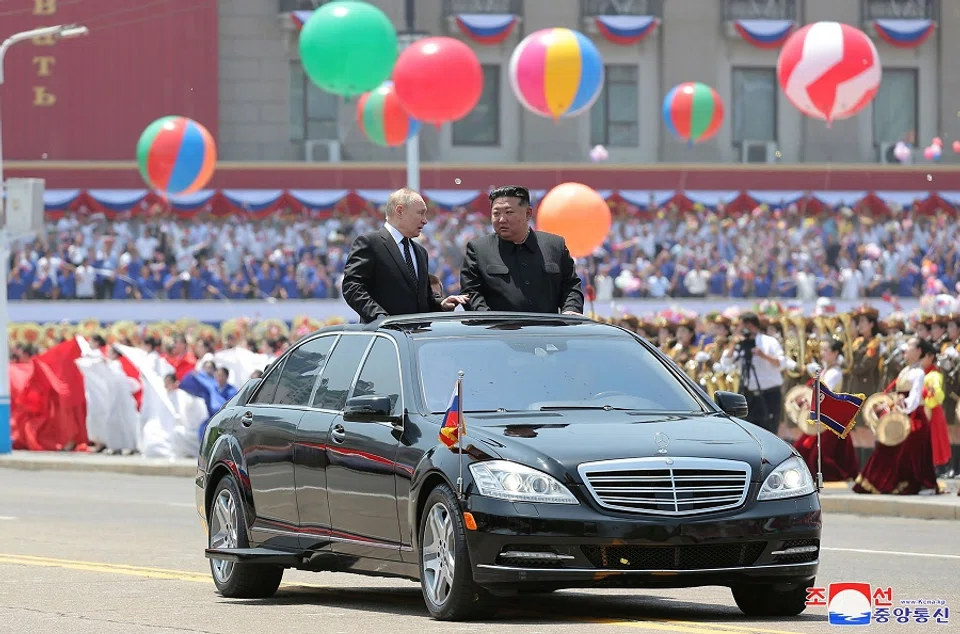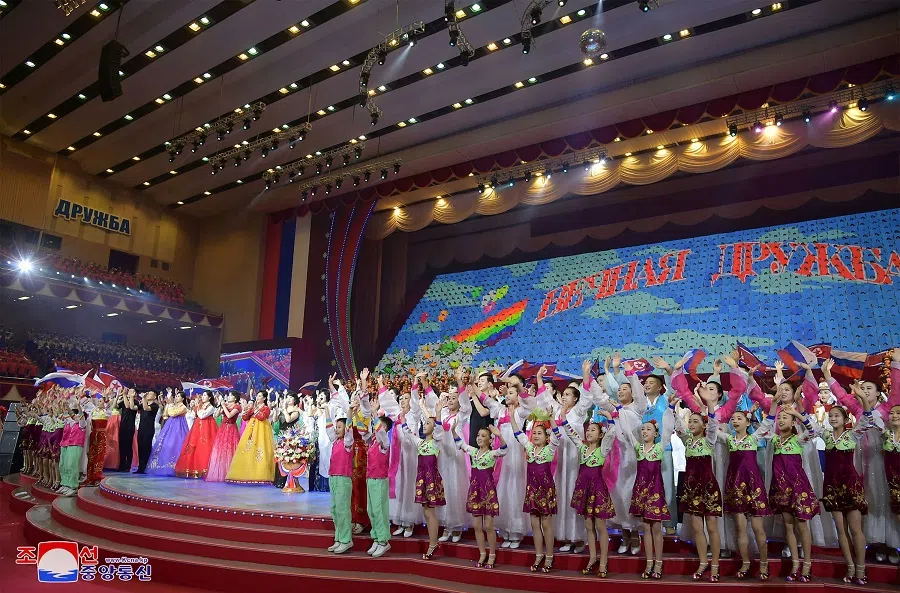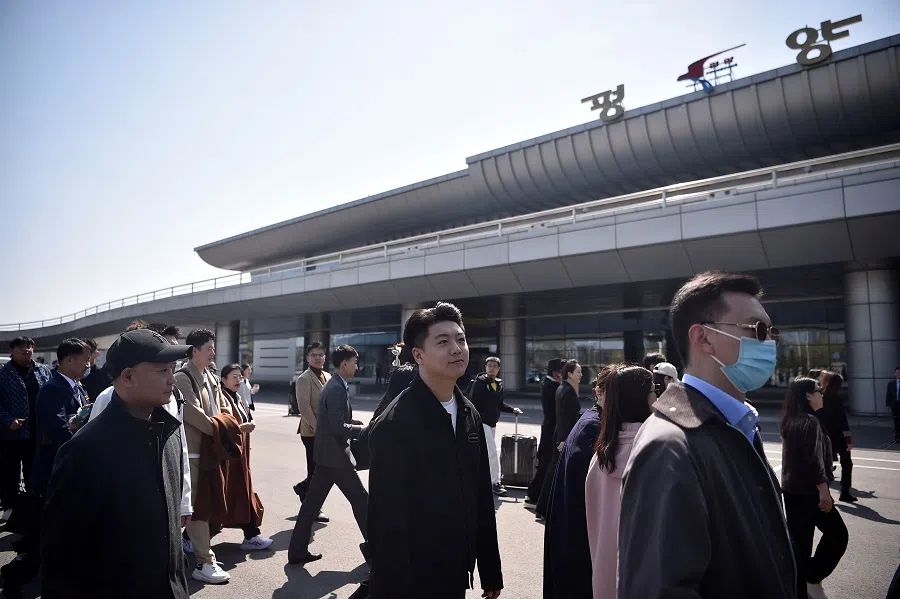China, Russia and North Korea: When interests align
With Russia needing cannon fodder in the Ukraine war and North Korea seeking global recognition, it is no surprise that bilateral ties are warming, says academic Dmitry Shalpentokh.

Putin’s visit to North Korea in June included several objectives. He wanted to enhance military-technical cooperation to ensure a continuous flow of North Korean weapons and possibly replace part of the migrant workers from Central Asia. He might have wanted to request for some Korean soldiers to join the Russian army in the latter’s fight in Ukraine.
For North Korea, it was a rare chance to decrease its dependence on China and receive a variety of benefits including supplies of grain and oil. One should remember that North Korea could deal with Russia almost as an equal with regard to technology and military hardware.
For China, the Russia-North Korea alliance could be beneficial as it would create an additional problem for the US.
North Korea is not all backwardness
Military-technical cooperation plays an important role in Putin’s design. Here, a fresh approach to North Korea as a backward state is needed. The predominant view, spread in the West, holds that North Korea — the only purely Stalinist state today — would be technologically backward. And indeed, how would technology/hard science thrive in a totalitarian state where everything is controlled by the state? Any achievements would either be ignored or attributed to espionage. These sentiments can be seen in the West’s approach to “Red China”.
How could these missiles have been built without a developed curriculum in the hard sciences, good universities and high schools which produced all these people who built nuclear arsenal?
The US government could not explain why China not only caught up with the US but exceeded it in many fields. And since it was convinced that China could not achieve them on their own, it came to some “convincing” conclusions: China simply stole scientific know-how from the US. The assumption led to a virtual witch hunt in American universities and the harassment of professors and Chinese students.
Many of those accused were said to have transferred sensitive information or discoveries to China. As a result, there was pressure to limit or stop the admission of Chinese students to programmes focused on the hard sciences. The proposal did not get through simply because of the universities’ stiff resistance. The measure, if implemented, would deprive them of substantial revenue.
The polarity between “creative” Western scholars and dogmatic and uncreative scholars in the totalitarian states is often false. Even in humanities/social sciences, Western scholars have limited freedom of expression in what they can publish or say on politically sensitive subjects such as race and gender.
The situation is better with the hard sciences. But still, there is a problem. Hiring is not often related to the best candidates as results are frequently of secondary importance. Evaluations by the department and university administration based on factors of race, gender, accessibility and inclusion often play a much bigger role in the hiring process.
In totalitarian societies, absolute obedience is a prerequisite. Even so, scholarly institutions, their professors and the administrations could not survive just on obedience and the totalitarian version of American “political correctness”.

Results are required. In addition, the education system is quite pragmatic, and emphasises the hard sciences. The system produced some remarkable results and these could be seen not just in China but also in North Korea, even though the outcomes are usually ignored.
Still a closer look at North Korean society might provide some insights. North Korea has a sophisticated nuclear arsenal and ballistic missile which could reach the US. How could these missiles have been built without a developed curriculum in the hard sciences, good universities and high schools which produced all these people who built nuclear arsenal? Thus, North Korean interactions with Moscow are not just unidirectional in the case of North Korea just looking for Russian technology/now how — it could be a mutually beneficial interaction.
The very fact that North Korean soldiers would be fighting Ukrainian forces and implicitly the forces of the entire West, would boost the regime’s pride and enhance the latter’s prestige on a global scale.
Fighting against the entire West
With losses on both sides mounting, Russia and Ukraine are both looking for cannon fodder. Russia is actively searching for potential soldiers from residents of post-Soviet republics of Central Asians, especially those who have received Russian citizenship. They are often sent to the front lines before too long. People from what Russians call the “distant abroad” are also recruited despite them not being proficient in Russian.
One might remember that jihadists in the Middle East were people from different countries and often did not understand each other. Still, this did not prevent them from being an effective military force. While Putin’s benefits from such arrangements are clear, those of his North Korean counterpart are obvious too.
To start with, the North Korean regime is not known for its respect for human life. Thus, the loss of North Korean soldier lives would not concern it very much. At the same time, the soldiers who survived would have received valuable combat experience.
One should remember here that despite the endless threats of starting a war, North Korea has not fought since 1953. The very fact that North Korean soldiers would be fighting Ukrainian forces and implicitly the forces of the entire West, would boost the regime’s pride and enhance the latter’s prestige on a global scale.
North Korean workers in Russia
Apart from the above win-win cooperation between North Korea and Russia, economic collaboration is clearly profitable and complementary for both sides.
Russia has a pressing need for more members of the workforce, which precedes the present-day Ukrainian war. The point here is that native residents have not been willing to engage in many trades which require hard work and provide meagre pay.
For those very reasons, Russian companies have invited hundreds of thousands, if not millions of migrant workers to do the job. Most of them are Muslims. Ordinary Russians are hardly pleased with these arrangements. They see Central Asians as people responsible for crime and terrorism. The recent terror attack in Moscow apparently substantiates their suspicions.
Prominent members of Russian society think that China would use their migrants to take over Siberia and the Far East. Koreans are free from such suspicions and are a disciplined workforce.
There are some Chinese among them and they are also viewed with suspicion but for different reasons. Prominent members of Russian society think that China would use their migrants to take over Siberia and the Far East. Koreans are free from such suspicions and are a disciplined workforce.
China and Russo-Korean deal
China’s relationship with North Korea is complicated. Despite the occasional assurance from Beijing that North Korea and China are strong allies, the relationship has not been smooth.
For the North Korean elite, China compromised on socialist principles and implanted in its very social-economic body the destructive germ of capitalism. For people in Beijing, the North Korean elite are emerging as fanatics and spoilers. Still, everything depends on the specific political context.
At the time when Beijing was cosy with Washington and benefited from “globalisation”, North Korea was the uncomfortable spoiler of bromance between Washington and Beijing. Now this situation is looking increasingly different. To start with, Beijing and Washington are not on the verge of divorce — both are too economically interdependent — but clearly not in a honeymoon relationship.
Washington and Brussels discovered that China was quick to catch up technologically, and could produce highly sophisticated goods at a much cheaper cost than both the US and Europe. Thus they imposed tariffs on Chinese electric cars and other goods. In response, China refused to buy more US T-bills and sold quite a few of them. There is also the Taiwan issue and other sources of friction between the two countries.
North Korea can do what China cannot. It can send weapons and equipment directly to Russia even when they were produced by China.

Finally, with all its reservations, China wants the Russians to win the war for it would make the US weaker and possibly split Europe, and all of these suit China’s interests. And in this case, North Korea can do what China cannot. It can send weapons and equipment directly to Russia even when they were produced by China.
While China is still concerned with sanctions against their banks and does not help in Russian financial transactions, Moscow became quite upset with that. North Korea, on the other hand, does not care. It already lived under all imaginable sanctions for quite a while.
China could be upset with the North Korea-Russia alliance only if its relationship with Washington improves visibly. Still, there is a chance for such developments in the foreseeable future.





